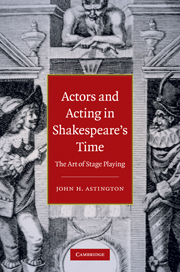Introduction: the purpose of playing
Published online by Cambridge University Press: 05 August 2012
Summary
In calling the school he founded in 1619, built and endowed with the money he had partly earned from acting, the College of God's Gift, Edward Alleyn recognized that talent on the stage is not entirely a matter of conscious human disposition, as is also the case in any of the arts. One cannot become a good actor simply by wanting to be one. We still speak of a gift for music, without which the most advanced and meticulous technical skill will not produce an outstanding player or composer. That human gifts for one accomplishment or another came from God was widely recognized in Shakespeare's time; even Dogberry in Much Ado About Nothing modestly defers to his creator the credit for his superior deductive powers. Alleyn's establishment was not to be a school for the arts or a dramatic academy – and the lack, largely speaking, of such institutions in England before the later seventeenth century will form one theme of this book – but an academic school for middle-class boys, in the tradition of such charitable foundations from the early Tudor period onwards, to produce, eventually, the future lawyers, clergymen, and civil servants the nation required. God's gift to Alleyn was not to be rewarded by fostering similar gifts in others, save as a part of his professional life as an active player in one of the leading theatre companies, and his consequent influence on his junior colleagues and apprentices, which was largely over by 1600.
- Type
- Chapter
- Information
- Actors and Acting in Shakespeare's TimeThe Art of Stage Playing, pp. 1 - 11Publisher: Cambridge University PressPrint publication year: 2010



